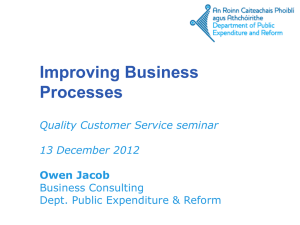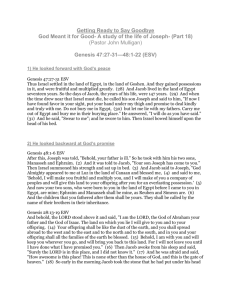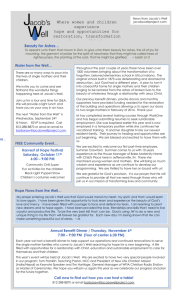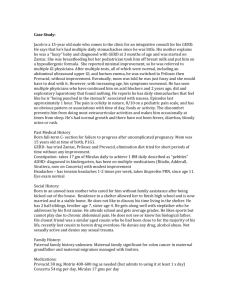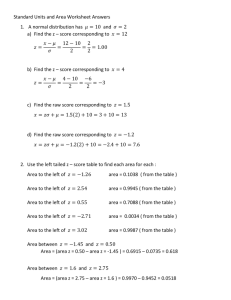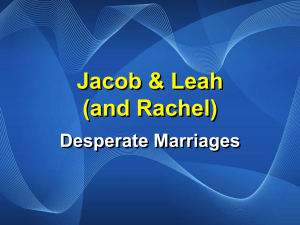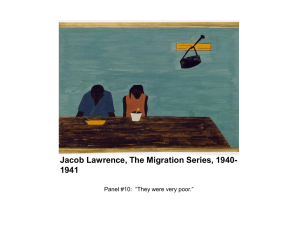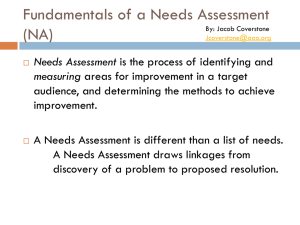Lesson - Finding Purpose
advertisement
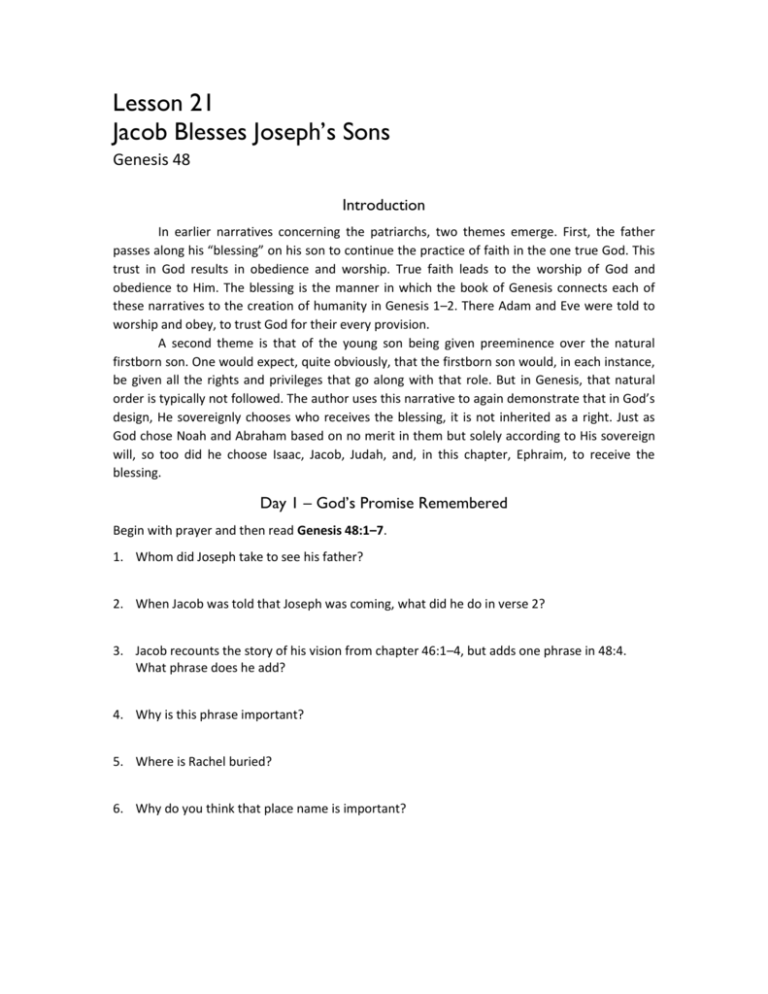
Lesson 21 Jacob Blesses Joseph’s Sons Genesis 48 Introduction In earlier narratives concerning the patriarchs, two themes emerge. First, the father passes along his “blessing” on his son to continue the practice of faith in the one true God. This trust in God results in obedience and worship. True faith leads to the worship of God and obedience to Him. The blessing is the manner in which the book of Genesis connects each of these narratives to the creation of humanity in Genesis 1–2. There Adam and Eve were told to worship and obey, to trust God for their every provision. A second theme is that of the young son being given preeminence over the natural firstborn son. One would expect, quite obviously, that the firstborn son would, in each instance, be given all the rights and privileges that go along with that role. But in Genesis, that natural order is typically not followed. The author uses this narrative to again demonstrate that in God’s design, He sovereignly chooses who receives the blessing, it is not inherited as a right. Just as God chose Noah and Abraham based on no merit in them but solely according to His sovereign will, so too did he choose Isaac, Jacob, Judah, and, in this chapter, Ephraim, to receive the blessing. Day 1 – God’s Promise Remembered Begin with prayer and then read Genesis 48:1–7. 1. Whom did Joseph take to see his father? 2. When Jacob was told that Joseph was coming, what did he do in verse 2? 3. Jacob recounts the story of his vision from chapter 46:1–4, but adds one phrase in 48:4. What phrase does he add? 4. Why is this phrase important? 5. Where is Rachel buried? 6. Why do you think that place name is important? Commentary Jacob was dying, he had already in chapter forty-seven had Joseph promise to bury him at Machpelah rather than in Egypt, and now he was to bless his children. Before Jacob blesses his sons (in chapter forty-nine), Joseph brings the two children born to him in Egypt to his father. While on his deathbed, Jacob finds renewed strength. His strength is revived when his two grandsons are brought in to him. This is an occasion for not simply blessing his grandsons, but for reiterating the wonderful and gracious promises of God. Jacob recounted the visit from God at Luz in Canaan where God said to him, I am God Almighty; be fruitful and multiply; a nation and a company of nations shall come from you, and kings shall come forth from you. The land which I gave to Abraham and Isaac, I will give it to you, and I will give the land to your descendants after you. (Genesis 35:11–12) But notice how Jacob recounts the event to Joseph: Behold, I will make you fruitful and numerous, and I will make you a company of peoples, and will give this land to your descendants after you for an everlasting possession. (Genesis 48:4) In the original encounter God had told Jacob to be fruitful and to multiply. This had happened, and Jacob recognized it was God who had caused this to happen. As with the rest of the events in the Joseph narrative, God is bringing His plan to fruition. This is also true in the second statement, where Jacob tells Joseph that God is the One who made him into a “company of peoples.” God had kept this promise. Finally, Jacob adds a phrase to the statement about God giving the Promised Land to his descendants. At the end is added the phrase, “for an everlasting possession.” Why has Jacob done this? Because it is quite clearly what was intended when God spoke to him at Luz. Just as God had further clarified his promises to Abraham (compare Genesis 12:23 and 17:1-7), so, too, had He further clarified His promises to Jacob. In other words, God was not simply promising that Jacob’s descendants would inhabit the land of Canaan, though they indeed would, but that from his seed would come everlasting salvation in an eternal kingdom. This messianic promise must not be overlooked in this chapter. When the tribes of Israel divide the inheritance in the Promised Land, Joseph will not receive one portion. Instead, his portion is now being divided between his two firstborn sons, Manasseh and Ephraim. We are told that Jacob did this in order to give a double portion to Joseph, who had been the instrument through which God saved His people (Genesis 48:21–22). Then, quite oddly, Jacob tells Joseph about Rachel’s death and subsequent burial at Bethlehem. There are several possible explanation for the inclusion of this statement, but the most likely is that the author wishes to make a connection between Joseph, who was the exemplar of the man of faith and thus the savior, and the Messiah who was yet to come. Rachel was Joseph’s mother and Jacob’s beloved wife, but she was not the mother of the son of promise. However, to group her together with God’s work of ultimate salvation through the Messiah, God had her buried in Bethlehem and eventually Jesus Christ born there. This interesting connection is also made in the Old Testament book of Ruth. The prophet Micah announces Bethlehem as the birthplace of the coming Messiah: But as for you, Bethlehem Ephrathah, Too little to be among the clans of Judah, From you One will go forth for Me to be ruler in Israel. His goings forth are from long ago, From the days of eternity. (Micah 5:2) Day 2 – Jacob Blesses Joseph’s Sons Begin with prayer and then read Genesis 48:1–16. 7. Whom does Joseph credit with giving him his two sons? 8. Read Psalm 127:3. How can you better demonstrate that you believe children (whether yours or someone else’s) are a blessing from the Lord? 9. What “surprise” did Jacob have in store for the sons of Joseph? 10. Read Genesis 12:1–3 and 17:1–8. What similarities do you see between those two promises and the two accounts of God’s promises to Jacob from this passage? 11. What does it mean to “walk before the Lord”? 12. Would you describe your spiritual journey as walking before the Lord in the same way as Abraham, Isaac, and Jacob? 13. Why do you think Jacob prayed that these children would “grow into a multitude in the midst of the earth”? Commentary Joseph brought his two sons to Jacob to be blessed. Because Jacob’s eyesight was poor they had to get close for him to see which son was which. Jacob hugged them and thanked God for them. He makes a touching statement in v. 11: “I never expected to see your face, and behold, God has let me see your children as well.” Jacob is grateful for his progeny. The blessing that Jacob pronounces on his grandsons is enlightening: The God before whom my fathers Abraham and Isaac walked, The God who has been my shepherd all my life to this day, The angel who has redeemed me from all evil, Bless the lads; And may my name live on in them, And the names of my fathers Abraham and Isaac; And may they grow into a multitude in the midst of the earth. (Genesis 48:15–16) Jacob teaches us a great deal about the God of the Bible and what it means to walk with Him. God is described as a shepherd to Jacob. This description is consistent with what Jacob had recounted to Joseph regarding God’s faithful leading to this point. The writer of Psalm 23 picks up on this theme and advances it. Jacob also calls God “the angel.” While generally the angel is one sent from the Lord, Jacob recognizes that in his encounter with the angel, it was God whom he actually encountered (see Genesis 35). A third theme is God’s deliverance from evil. In Genesis the contrast between good and evil has persisted since chapter one. Here God is portrayed as the Redeemer. Jesus teaches his disciples to pray that God would “deliver us from evil” (Matthew 6:13). In his blessing of Manasseh and Ephraim, we discover the care, protection and provision of the God of the Bible. He is not only faithful to keep His promises, He is also faithful to care for His own. Day 3 – The Great Reversal Begin with prayer and then read Genesis 48:8–22. 14. Why did Joseph try to switch his father’s hands? 15. What prophecy does Jacob make about Ephraim and Manasseh in verse 19? 16. What benefit did Joseph receive by having his two sons blessed by Jacob? – v. 22 17. Describe the general pattern of which son receives the blessing of the firstborn throughout Genesis. 18. Why did you think God so often chose the younger son over the naturally firstborn? 19. Do you ever think you are deserving of some right from God? 20. Read Isaiah 55:8-9 and record your thoughts. Commentary As the blessing of Manasseh and Ephraim commences, Joseph notices that Jacob has placed his right hand—the hand symbolizing the firstborn—on the wrong son. Manasseh was the firstborn but Jacob is blessing Ephraim as the firstborn. As Joseph tries to move his hands, believing that his sight-impaired father has simply confused the two boys, Jacob corrects his son: I know, my son, I know; he also will become a people and he also will be great. However, his younger brother shall be greater than he, and his descendants shall become a multitude of nations. (Genesis 48:19) As before, the younger has been blessed rather than the older. Once again this displays God’s sovereign choice of the means by which He will bring about His plan. God’s will cannot be thwarted, and is not subject to any confines, cultural or otherwise. When Jacob says to Joseph, “God will be with you, and bring you back to the land of your fathers,” he is reminding him of God’s promise of ultimate salvation. Jacob’s faith is strong at the end; he has fought the good fight and finished the race of faith.
